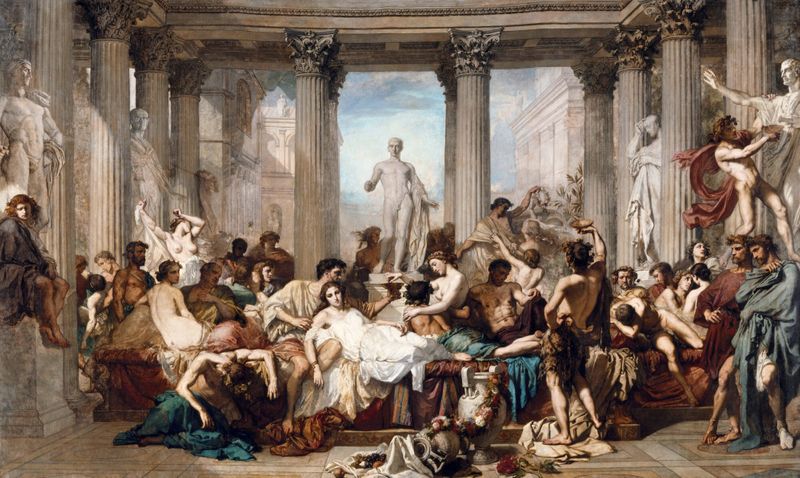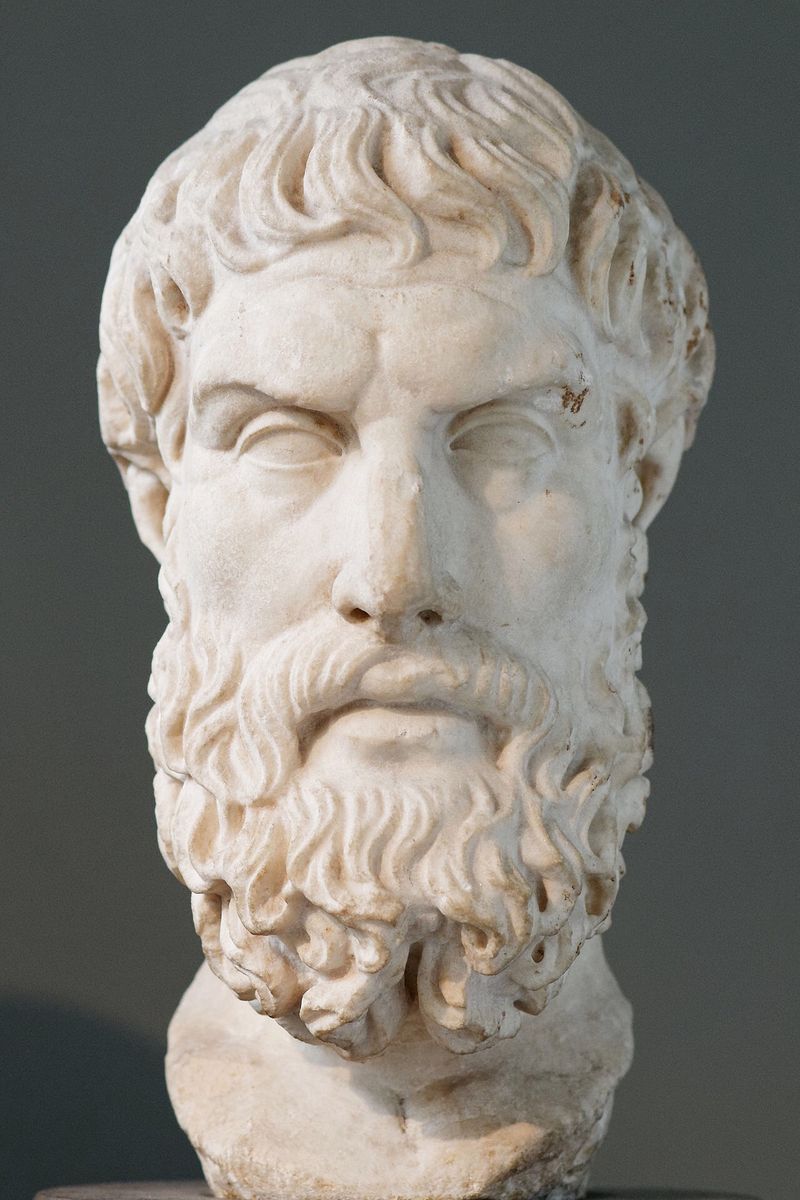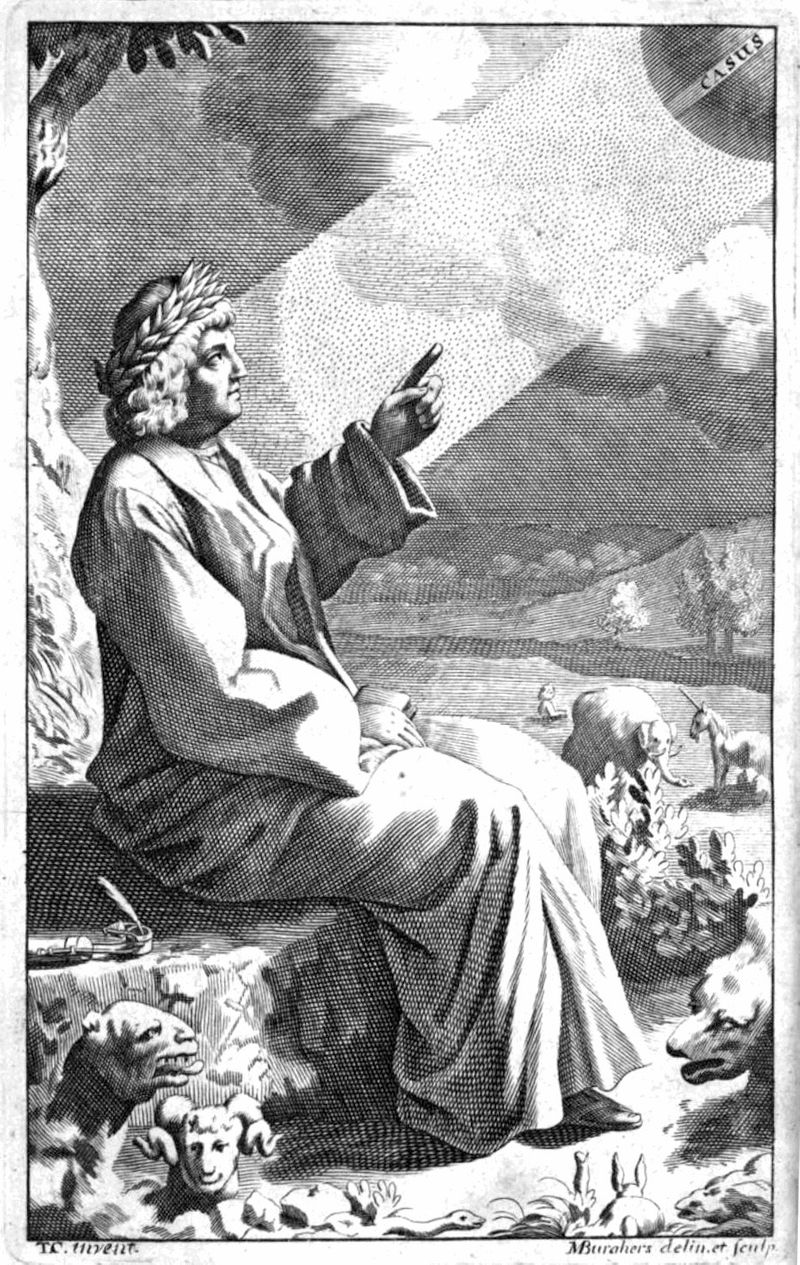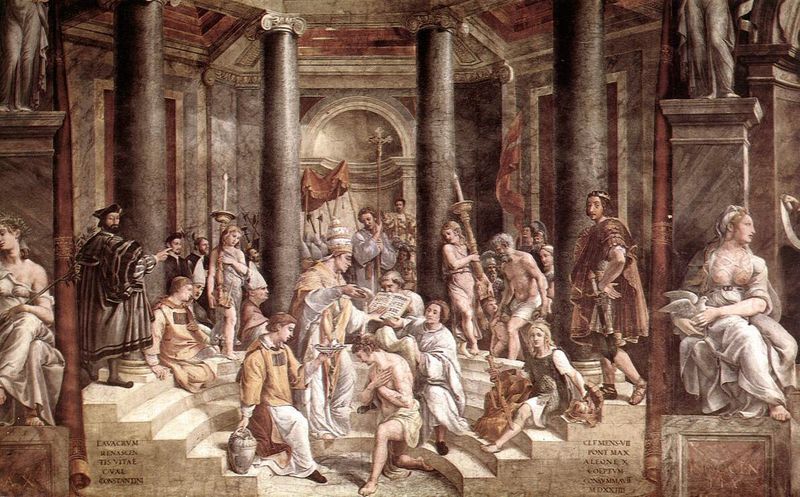Could Epicurus save us? clipping
February 18th, 2019
A philosophy of pleasure could cure our modern ills.

Rome During the Decadence, Thomas Couture, 1847. Epicureanism for a long time had a reputation as a philosophy that encouraged reckless and immoral hedonism. Epicurus was a hedonist, but encouraged the pursuit of a natural state of pleasure that comes when we free ourselves of desire. His philosophy was very popular throughout the Roman Empire. (Image source: Wikipedia)
For over a hundred years archaeologists have been reconstructing, piece by piece, a message of hope from the ancient past.
The message is estimated to comprise of 25,000 words inscribed in 260 square meters of stone. That stone crumbled and was scattered about the ruined site of the ancient Greek-speaking hilltop city of Oinoanda near the south-western coast of modern Turkey.
The author of the message was a man named Diogenes, who in old age commissioned the inscription for the city’s portico wall as a gift for fellow citizens, foreign visitors and future generations. He wrote,
"I wanted, before being taken by death, to compose a fine anthem to celebrate the fullness of pleasure and so help those who are well constituted."
Diogenes wanted to cure a "common disease, like a plague" which gave people a "false notion about things." The plague he describes is, in a word, desire.
Diogenes was a follower of the philosopher Epicurus and his wall text is a comprehensive explanation of the philosophy of Epicureanism.
Archaeologists are still painstakingly piecing together the inscription from among the remains of the ancient city. Only about a quarter has been assembled so far.
As recent as 2008 a coherent passage was reconstructed allowing us ever more insight into this ancient philosophy that once had hundreds of thousands of followers.
Little is known of Epicurus the philosopher. There are surviving writings, but nowhere near the hundreds of books he supposedly wrote, only fragments and letters.
Much of what we do know about Epicureanism comes from Diogenes’s inscription and the sublime poem by the Roman Lucretius, Of the Nature of Things. A great deal was written about Epicurus over the ages – much of it critical – but we are now seeing a clearer picture of the man and his philosophy.
Epicureanism is a practical ethical doctrine based on a purely physical understanding of the universe. In many ways it is very much a product of its time: the aftermath of Alexander the Great’s vast expansion of Greek influence and his sudden death.
Humble Beginnings
Epicurus was born into a modest household in 341 BCE in the Athenian colony of Samos. Schooled in Athenian philosophy, he rejected the ideas of Platonism.

A Roman bust of Epicurus. The philosopher was immensely popular at the time of the Roman Republic, his image was reproduced on an industrial scale. (Source: Wikipedia)
For the new breed of philosophers in the wake of Alexander the Great’s death, philosophy had become more concerned with well-being rather than knowledge. The world had become increasingly chaotic, and Platonism provided no antidote to chaos.
New schools emerged – like Stoicism and Skepticism – that looked inward for peace in a strife-riven world. In his mid-thirties Epicurus founded his own school and commune outside of the walls of Athens called "The Garden".
Epicurus had many radical ideas, one of which was that philosophy should be accessible to women, an idea scandalous to Athenian culture, dominated as it was by propertied men.
In a society in which women were barely permitted to leave their house, Epicurus opened the doors of The Garden to them. Slaves too, were welcome. Epicurus was wilfully blind to the strict hierarchy governing Athenian social relations.
Rumours circulated about the commune among the civic-minded Athenians: a commune that permitted women to study as men could must be up to no good. What’s more, the commune was dedicated to hedonism.
Hedonism
Epicurean philosophy is associated with pleasure. As such it has an undeserved reputation in the modern world as making a virtue of the selfish pursuit toward that end.
This is not entirely untrue, but it is an over simplification that gives a false impression of Epicurean goals. In the Christian world — particularly in the Middle Ages when little was known of Epicureanism — Epicurus was damned as a hedonist who indulged in orgies and rich banquets, a philosopher-patron of drunkards and whores.
Epicurus was a indeed a hedonist. He sought to answer the question "what makes us happy?" and from there went on to teach that happiness is the greatest good.
But rather than maximising happiness through greedy consumption, Epicurus looked at the problem through the other end of the telescope. The central tenet of Epicurean philosophy can be summarised easily:
To be happy you need to change your desires
To Epicurus, happiness is the default condition of living. But humans have afflicted themselves with unnecessary desires.
There are two kinds of pleasure: kinetic pleasure and static pleasure. Kinetic pleasure is active fulfilment, static is the default state of having no immediate needs, it is the tranquility of the absence of pain.
Epicurus argues that we only need a limited amount of kinetic pleasure (eating, drinking) to maintain static pleasure. All other desires and worries can be disregarded with a little effort and reason. In fact, it’s in our best interests to disregard worries and desires, since they never cease. He wrote:
The wealth required by nature is limited and easy to procure, but the wealth required by vain ideals extends to infinity.
The job of philosophy was to reset the human condition to its default state. The philosopher is like a physician for the mind. "There is no use in philosophy," he wrote, "unless it casts out the sickness of the soul."
Epicurus believed happiness to be the highest good for people because he believed this was our only life. The philosopher was a materialist who didn’t believe in divine providence, immortality of the soul or creation.
Perhaps to avoid the capital charge of impiety, he claimed that the gods existed but lived in their own world, and that we lived in ours. If the gods were perfect, he reasoned, why bother intervening in human life?
Lucretius, the poet of Epicureanism, was more provocative. He wrote that the philosophy inverts religion: it exalts mankind while "trampling superstition underfoot".
"For all eternity we shall no longer exist." The philosopher wrote to those who believe in life after death. "But you, although you are not in control of tomorrow, are postponing happiness." "Death," he famously stated, "is nothing to us."
The only impediment to happiness then is desire. Our longings for material, social and romantic fulfilment seem to postpone happiness in the same way that a post-mortal paradise does.
Epicurus believed that we have the power to control our desires, a power that is built into the nature of the universe: free will.
Free Will in the Swerve of Atoms
Epicurus’s ideas about the universe were mostly built upon those of Democritus, his chief influence. The universe, both philosophers held, is composed of tiny invisible atoms that move (or fall) though the void.

The Roman poet Lucretius. Engraved by Michael Burghers from the frontispiece to Thomas Creech’s translation of Of the Nature of Things, printed in London 1714. (Source: Wikimedia) Lucretius was an eloquent and provocative defender of Epicureanism, his (only known) poem Of the Nature of Things was rediscovered during the Renaissance and informs much of what we know about the Epicurean explanation of the universe.
Everything – both philosophers reasoned before microscopes existed – could be divided into parts, but at some point it would be impossible to divide a part. Therefore, everything is a composite of atoms. Void is the necessary space through which atoms can move, otherwise there would be no change.
Democritus and Epicurus thought that everything was composed of atoms and nothing else. "The mind," he wrote, "is made of matter." This makes them both "empiricists". Empiricists believe the only valid knowledge is derived from the senses taking in the material world.
But where Democritus believed everything in the universe to be determined by the course of its atoms (the law of cause and effect), Epicurus believed that the atoms are swerved on their course. The unpredictability of this "swerve" is what is responsible for free will among living beings. This is most eloquently relayed to us by Lucretius, who wrote in his Nature of Things:
"When atoms move straight down through the void by their own weight, they deflect a bit in space at a quite uncertain time and in uncertain places, just enough that you could say that their motion has changed. But if they were not in the habit of swerving, they would all fall straight down through the depths of the void, like drops of rain, and no collision would occur, nor would any blow be produced among the atoms. In that case, nature would never have produced anything."
This a materialist account of free will. There is no immortal soul. Only the atoms of the universe of which we are composed. Our free will – our conscious choices – can only be explained by the indeterminate "swerve" of those atoms. Lucretius wrote in verse:
"If atoms never swerve and make beginning
of motions that can break
the bonds of fate
And foil the infinite chain of cause and effect
What is the origin of this
Free will of living creatures throughout the earth?
If we didn’t have free will, Epicureanism reasons, we would be slaves to our desires and nothing more. We’d be led to the things we need like a stone is pulled to the centre of the earth by gravity. So while Epicureans were strict materialists, they did not subscribe to the ideas of cosmological determinism thanks to the swerve in the rain of atoms.
Our freedom to deny unnecessary desire is, then, the key to happiness. Epicurus made a distinction between two types of desire: necessary and unnecessary. The distinction is easy to make: unnecessary desires cause no pain if left unfulfilled. For example, if I were not to fulfil the desire for water, I would dehydrate and die. If I were not to fulfil the desire for a fine red wine, my body would not be harmed.
If we take pleasure in the simple nourishments that nature offers, we will be happy. Friendship was prized over status and sexual gratification. Simple pleasures, according to Epicureans, is the key to the truly good life.
"One must regard wealth beyond what is natural as of no more use than water to a container that is full to overflowing."
Some pain is worthwhile if we use our innate reason to judge that it will bring enough pleasure to outweigh the pain.
The Rise and Fall of Epicureanism
Epicurus became immensely popular in both the Ancient Greek world and the Roman Empire which consumed it. Cicero, who was critical of Epicureanism, complained of the cult-like following the philosophy gained among Romans.
The philosophy became something like a secular religion. Monastery-like communes sprang up around the Hellenised world where devoted Epicurean sages led radically simple lives. Images of the philosopher were produced on an industrial scale on commonplace objects like drinking cups and rings for the masses.
The idea was that followers of the creed had the constant reminder to behave as the long-dead sage would, much like the ubiquitous images of Christ and WWJD bumperstickers of today.
The popularity of Epicureanism among the masses waned as the popularity of Stoicism – more suited to the harsh Roman mentality and sense of civic duty – grew after the Republic collapsed.
The revolutionary potential of Epicureanism as a philosophy against material wealth, status and sexual desire was for the most part scorned or assimilated as an academic curiosity by the Roman rich. (The emperors Hadrian and Marcus Aurelius tolerated the study of Epicureanism because both were keen on philosophy in a general sense).
By the late Roman Empire, the philosophy had been attacked by a new foe. Christianity became the official religion of the Roman Empire from Constantine’s rule onwards.

The Conversion of Constantine the Great by Raphael, 1517. Once Christianity became the favoured religion of the Roman Empire, the materialist philosophy of Epicureanism all but died off.
The new monotheistic religion was openly hostile to the materialist philosophy that denied the immortality of the soul and prized sensory pleasure. Epicureanism’s demise was quick under the dominance of the church.
The slanderous rumours about the hedonist sage snowballed into grotesque fantasies into the Middle Ages. Epicurus, according to Christian writers, was a sex maniac with a penchant for orgies with virgins. Christianity, a world-view that prizes sacrifice and altruism, is simply incompatible with hedonism.
It wasn’t until long after the Renaissance that Epicureanism started to gain more recognition as a comprehensive philosophical system. This is largely thanks to the surfacing of Lucretius’s poem in 1417 (in a German monastery) and the archeological evidence – such as Diogenes’s inscription – being pieced together to this day.
More could be discovered in only a matter of years. When Mount Vesuvius erupted in 79 C.E, it buried the so-called Villa of the Papyri in Herculaneum under 25 meters of ash. The villa, supposedly once owned by Lucius Calpurnius Piso, the father-in-law of Julius Caesar, contained thousands of scrolls in a library managed by the Epicurean philosopher Philodemus.
Hundreds of pieces of papyri and scrolls have been recovered. Many so charred by the pyroclastic blast of the volcano that they are unreadable to the naked eye and could be destroyed if opened.
Archaeologists have deciphered some fragments of Epicurus’s works, incrementally improving our understanding of the philosophy. New CT scanning technology will soon enable scholars to decipher potentially hundreds more of the charred scrolls without damaging them. Perhaps lost texts by Epicurus are among them.
A Cure the World Needs Now?
These archeological developments could not have come at a more appropriate time. While Epicureanism was intended to cure individuals, it could rescue our own modern world from the excesses of consumerism.
Whether or not Epicureanism was good for civil society is a matter of debate among scholars. Epicurus practised a political quietism, retreating from society to his commune where friendship was valued over citizenship.
The philosopher also wrote: "It is impossible to live pleasurably without living prudently, honourably and justly." This statement points to a sense of civic duty, but the ultimate aim of the Epicurean "physician" is saving the individual soul.
What is clear is that Epicurus makes no appeal to altruism. Finding pleasure in giving back to society seems to hold no place in the philosophy which would discount wealth in the first place (although this was contradicted by Diogenes’s no doubt expensive inscription, intended as it was to save people from the torments of desire).
Instead Epicurus’s philosophy perhaps shows that society can mend itself even as its people act in self-interest. The caveat here of course is to bridle that self-interest by negating unnecessary desire.
Desire is very profitable in the modern world; businesses stoke our desires constantly with advertising. Many people in the western world are stuck on what psychologists call the "hedonic treadmill".
Many of us work in dreary, meaningless jobs to have the money to fulfil material desires only for new desires to emerge. We are stuck in a tailspin of desire that could make us miserable rather than happy.
Inanimate objects like cars, gadgets and jewellery seem to have a narcotic effect on us: the "high" of the purchase soon fades as we start to desire other acquisitions.
This is not just a sickness to the individual soul. The ecology – our garden – is being decimated by the material cravings of human desire.

Could Epicureanism, by appealing to self-interest, save our ecology by taming the desire for material wealth? Picture: Pollution in Ghana (source:Wikipedia).
Our world is a world of finite natural resources greedily exploited, a world of "boom and bust" chaos as desire-fuelled debts ebb and flow. Epicureanism could be seen as not only a guide to find individual happiness but also a collective imperative to save ourselves and our environment from destruction.
The world, after all, is for all to share and Epicureanism was a cosmopolitan philosophy that made no distinctions of nationality. Diogenes’ wall text makes it clear that his message is:
"not least for those called foreigners, for they are not foreigners. For while the various segments of the Earth give different people a different nation, the whole compass of this world gives all people a single country, the entire earth, and a single home, the world."
Desire is an endless chain. What we cannot have we crave and when we get it we want something else. Epicurus taught us that with a little discipline, and a belief in our free will, we can break that chain.
What nature can provide for us is enough for joy. We just need to learn to know what true joy is.
Thank you for reading.
Measure
Measure
Keep in touch!